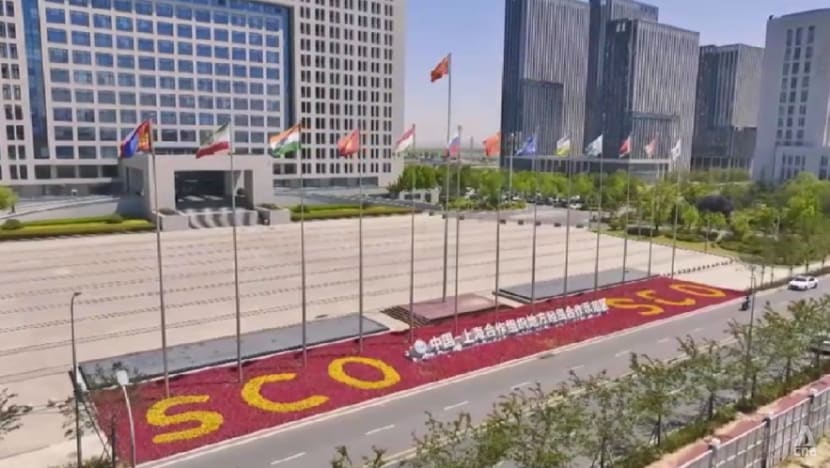China’s high-profile SCO summit: Who's attending and what's on the agenda?
Observers say the two-day summit in Tianjin, attended by political heavyweights, could serve as a strategic platform for Beijing to boost its diplomatic clout.

The Shanghai Cooperation Organization (SCO) summit from Aug 31 to Sep 1 in the northeastern port city of Tianjin could serve as a strategic platform for Beijing to boost its diplomatic clout, say analysts.

This audio is generated by an AI tool.
BEIJING: Chinese President Xi Jinping will welcome more than 20 world leaders at the Shanghai Cooperation Organization (SCO) summit on Sunday (Aug 31).
The two-day meeting in the northeastern port city of Tianjin will be the regional security forum’s largest yet, at a time when geopolitical and trade tensions are simmering.
Xi will host a high-profile guest list that includes Russian President Vladimir Putin and India’s Prime Minister Narendra Modi, alongside leaders from the Middle East, Central Asia and South Asia.
United Nations Secretary-General Antonio Guterres and Association of Southeast Asian Nations (ASEAN) Secretary-General Kao Kim Hourn will also be in attendance.
The expanded presence of ASEAN is notable. Leaders from five member states will be at the summit, including Indonesian President Prabowo Subianto, Malaysian Prime Minister Anwar Ibrahim and Vietnamese Prime Minister Pham Minh Chinh.
The Southeast Asian bloc is China’s top trading partner, with total trade in the first quarter this year reaching 1.7 trillion yuan (US$234 billion), marking a 7.1 per cent year-on-year increase.
Analysts said the US tariffs on China during the 2018 trade war planted the seeds for Chinese manufacturers to pivot to Southeast Asia.
Today, those seeds have taken root and branched out into emerging domains like digital infrastructure. At the same time, projects under the Belt and Road Initiative continue to grow.
Beyond the show of diplomatic alignment, ASEAN leaders could also take the chance to expand trade and investment exchanges at the summit.
"Indonesia is a BRICS member now, and Malaysia under Anwar has taken a clear China-friendly and West-sceptical bent," said Brian Wong, a fellow at the University of Hong Kong’s (HKU) Centre on Contemporary China and the World.
"Yet, their attendance is largely and likely non-committal – keen to engage but not keen to be nominally subsumed into what is widely perceived as a Sino-Russian-led military and security cooperation forum."
SCO & MILITARY PARADE
The SCO was founded in 2001 with a goal of enhancing regional security and stability. It has since expanded to 10 nations: China, Russia, Kazakhstan, Kyrgyzstan, Tajikistan, India, Pakistan, Iran and Belarus.
Membership accounts for an estimated 42 per cent of the world's population and around a quarter of global gross domestic product (GDP).
The grouping is seen by some as Eurasia’s answer to United States-led frameworks like the North Atlantic Treaty Organization (NATO) and Group of Seven (G7), and acts as a counterweight to Western influence.
Following the meeting, Beijing will stage a massive military parade on Wednesday to mark 80 years since the formal surrender of Japan during World War II.
Some summit attendees will stay on for the parade, joined by other foreign heads of states including North Korean leader Kim Jong Un, Belarus' President Aleksandr Lukashenko and Iran's President Masoud Pezashkian.
China last hosted the SCO summit in 2018, at the height of the trade war with US during President Donald Trump's first term in the White House.
This time, the grouping is expected to sign an agreement that will map their long-term strategy and balance members' interests – whether shared or conflicting.
SCO DEVELOPMENT BANK
China is set to push – again – for an SCO Development Bank, a plan stalled since 2010 over Russia’s opposition.
Moscow was concerned the bank would give rise to Chinese influence in capital and goods, potentially undermining Russian business interests in Central Asia.
But since its full-scale invasion of Ukraine in 2022 and the resulting wave of Western sanctions, Russia’s stance has softened, showing greater willingness to engage with China’s proposals, said analysts.
While SCO member states are expected to be keen on exploring alternative financing arrangements during the summit, analysts doubt there will be progress.
The grouping operates by consensus but divisions run deep, making it tough to push agreements through. There are also existing platforms like the New Development Bank and the Asian Infrastructure Investment Bank.
“The primary hurdle has been a lack of consensus on funding and governance, and concerns over China's potential dominance,” said Dylan Loh, assistant professor of public policy and global affairs at the Nanyang Technological University (NTU).
“A lot more will still need to be done in building consensus on who funds, who can exercise the most influence, how governance will look like (and) what purposes it will primarily serve.”
GLOBAL CONFLICTS
The forum typically focuses on security and counter-terrorism, as well as economic, trade and energy cooperation.
But amid ongoing global conflicts in the world, the war in Ukraine and Iran-Israel tensions are also likely to feature in discussions.
The summit comes just two weeks after Putin met Trump in Alaska in talks that yielded little breakthrough towards ending the Ukraine war.
Beijing has called for a peaceful resolution to the conflict, but Ukrainian President Volodymyr Zelenskyy has ruled out China as a security guarantor.
Amid the spectrum of geopolitical variables, China views itself as a catalyst to foster dialogue.
“China remains committed to prioritising the SCO in its neighbourhood diplomacy,” said Assistant Foreign Minister Liu Bin.
“Faced with choices about the way forward, the Shanghai Spirit - which transcends outdated concepts such as historical conflict, Cold War thinking and zero-sum games - remains as relevant as ever and demonstrates its enduring value.”
The Shanghai Spirit refers to a set of principles centred on mutual trust and benefit, equality, consultation, respect for diversity of civilisations and the pursuit of common development.
HKU's Wong said the summit allows for discussions about conflicts from different perspectives.
“We shouldn't harbour the expectations that this is going to be a panacea or kumbaya solution to all the problems and tensions that exist in a bloc,” he said.
“What it can do, at the very least, is to provide a space in which these grievances can be aired and talked about in a manner that's free of interference from less geopolitically aligned actors, including, but not limited to, the US and select members of the Global North.”
CHINA-INDIA TIES
The summit will be Modi’s first visit to China since 2018, following years of strained ties.
Relations between the neighbours have been icy since 2020, when decades-long border tensions escalated into deadly skirmishes.
But recent signs of a thaw have emerged. India’s pivot comes after the US refused to lower tariff rates on the South Asian giant, triggering an unexpected resetting of global alliances.
“(India) is facing pressures, that in many ways compel (its government) to demonstrate to the US that, 'look, we have these options out there, and these options are not necessarily ones that you will like',” said NTU's Loh.
Last week, Chinese Foreign Minister Wang Yi visited New Delhi to lay the groundwork for a meeting between Modi and Xi. He stressed the need to view each other as partners, rather than adversaries.
Still, differences and suspicions remain between India and China, said Drew Thompson, a senior fellow at NTU’s S Rajaratnam School of International Studies.
“We've seen China support India's opponents and adversaries. (So), Modi has a lot of good reasons to go to the summit … and pursue India's interests, to maybe patch up relations with China,” he told CNA’s Asia First programme.
Last week, Wang said China is Pakistan’s “most reliable partner and strongest supporter”.
In June, India refused to sign a joint statement at an SCO defence summit, saying it favoured Pakistan as it omitted reference to the deadly Apr 22 attack on Hindu tourists in Kashmir. The incident led to the worst fighting in decades between the two nations.
Thompson noted there is also scepticism, along with other underlying dynamics, within the grouping.
“There's a lot of distrust between members despite the handshakes and facade. (For instance), the China-Russia relationship is complicated despite a lot of parallel interests,” he said.
Still, an expanding SCO membership and increasing number of observers and partners indicate growing support for a more multilateral and multipolar global order.
“Certainly there's a trend where there's concern about over-reliance on any one major partner. Russia doesn't want to be totally dependent on India. (Some) countries are not as comfortable dealing with the US or Europe,” Thompson said.
“So, (the SCO) gives them alternatives, but I don't think there's a common agenda to oppose and counter the West. It's really part of an alternative that also includes the West in many of these countries' economic and security strategies.”


















